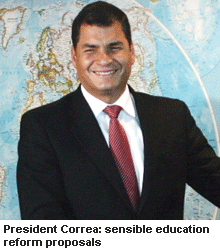Education reforms in Ecuador (pop.14 million), promoted by its left-wing president, Rafael Correa, have led to protests and tear-gas on the streets. The teachers’ union and the students’ federation, both linked to a Maoist opposition party, are furious at proposals to sack bad teachers and make schools and universities account better for the $2.3 billion (Rs.11,115 crore) or so a year the government spends on them.
 Ecuador’s schools are poor even by South American standards. Although almost all of its children enrol in primary education, less than two-thirds make it to secondary school. By 2015, the former economics professor re-elected president for a second term in April, wants state schools to match the quality of elite private ones like the Lycée La Condamine in the capital, Quito, which his own children attend.
Ecuador’s schools are poor even by South American standards. Although almost all of its children enrol in primary education, less than two-thirds make it to secondary school. By 2015, the former economics professor re-elected president for a second term in April, wants state schools to match the quality of elite private ones like the Lycée La Condamine in the capital, Quito, which his own children attend.
However Correa is going about his reforms more sensibly than his counterpart in Venezuela (pop.27 million) Hugo Chávez. Awash with oil revenues because of strong crude prices, since coming to office in January 2007, he has spent around US$280 million (Rs.1,344 crore) repairing schools and building new ones. In impoverished places like Zumbahua, a remote village in the Andes where Correa once did voluntary work, high-tech “schools of the millennium” have risen among the maize and potato fields. Some of the cheapest private schools have already closed as state schools have scrapped fees and started providing meals for pupils, says Verónica Benavides, a senior education official.
But it is not just about spending more money. Correa wants to supervise more closely how the education budget is spent, and to improve the quality and consistency of teaching. At present, schools have so much leeway that comparisons between the wide variety of leaving certificates they issue are all but meaningless. The government is seeking to impose a standard, minimum syllabus.
So far the reforms seem highly popular except, unsurprisingly, among the teachers. Edmund Gordillo, a teacher in Quito with 30 years’ experience, complains that coercion is the wrong way to go about reforming. Others grumble at their meagre pay: a typical teacher, with almost 25 years’ experience earns only around US$650 (Rs.31,545) per month. The government is promising pay rises but to the union’s disgust, it intends to link them to performance, not seniority.
Ecuador’s universities are also having to shape up. Low-quality private ones will be shut, while state-funded ones will have to account publicly for the US$490 million (Rs.2,379 crore) a year they receive. Professorships will be opened up to foreign academics. Correa’s reforms are non-negotiable, insists René Ramírez, his planning secretary. If the union and student groups ramp up their protests, the government is ready to call a referendum to demonstrate that Ecuadoreans support the president’s policies, he says.
(Excerpted and adapted from The Economist)